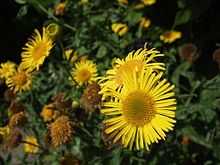Pulicaria dysenterica
| Pulicaria dysenterica | |
|---|---|
 | |
| Scientific classification | |
| Kingdom: | Plantae |
| (unranked): | Angiosperms |
| (unranked): | Eudicots |
| (unranked): | Asterids |
| Order: | Asterales |
| Family: | Asteraceae |
| Tribe: | Inuleae |
| Genus: | Pulicaria |
| Species: | P. dysenterica |
| Binomial name | |
| Pulicaria dysenterica (L.) Bernh. | |
Pulicaria dysenterica, or Common Fleabane, is a species of Fleabane in the daisy family. It is native to Europe and western Asia where it grows in a variety of habitats ranging from semi-arid Mediterranean woodlands to wetter situations.[1] P. dysenterica is perennial and can form dense clusters of plants, spreading by its roots. It flowers at its maximum height of about 6 dm.[2] Leaves are alternately arranged and clasp the stem, which itself contains a salty-astringent liquid. The yellow inflorescences are typically composed of a prominent center of 40-100 disc florets surrounded by 20-30 narrow, pistillate ray florets. When setting seed the flower heads reflex.[3]
Fleabane's common name comes from its former use as an incense to drive away insects.[4] Other past uses include treatments for dysentery and unspecified ocular maladies.[5]
External links
- Pulicaria dysenterica at Plants for a Future Site
- Common Fleabane at Naturespot
- Pulicaria dysenterica at Emorgate seeds
References
- ↑ http://chestofbooks.com/flora-plants/flowers/British-Wild-Flowers-1/Fleabane-Pulicaria-Dysenterica-Gray.html
- ↑ http://www.pfaf.org/database/plants.php?Pulicaria+dysenterica
- ↑ http://www.efloras.org/florataxon.aspx?flora_id=1&taxon_id=127631
- ↑ http://www.efloras.org/florataxon.aspx?flora_id=1&taxon_id=127631
- ↑ http://chestofbooks.com/flora-plants/flowers/British-Wild-Flowers-1/Fleabane-Pulicaria-Dysenterica-Gray.html